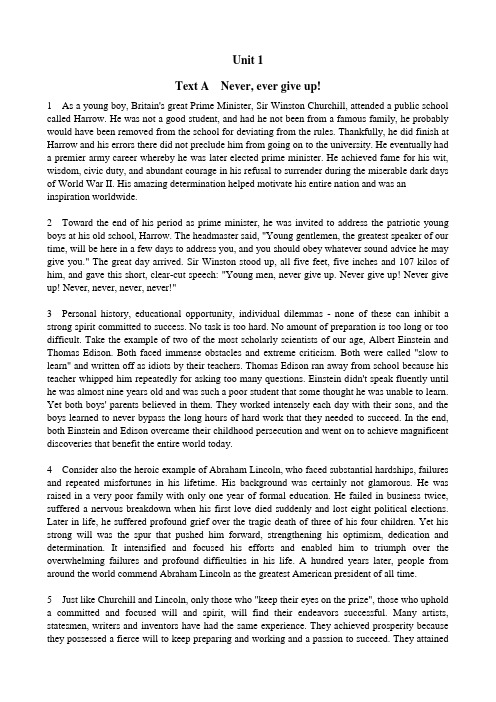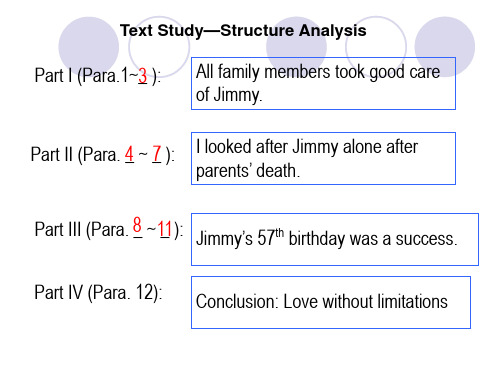小学英语语法新视野3 Unit 1
- 格式:ppt
- 大小:2.13 MB
- 文档页数:23


Unit 1Text A Never, ever give up!1 As a young boy, Britain's great Prime Minister, Sir Winston Churchill, attended a public school called Harrow. He was not a good student, and had he not been from a famous family, he probably would have been removed from the school for deviating from the rules. Thankfully, he did finish at Harrow and his errors there did not preclude him from going on to the university. He eventually had a premier army career whereby he was later elected prime minister. He achieved fame for his wit, wisdom, civic duty, and abundant courage in his refusal to surrender during the miserable dark days of World War II. His amazing determination helped motivate his entire nation and was an inspiration worldwide.2 Toward the end of his period as prime minister, he was invited to address the patriotic young boys at his old school, Harrow. The headmaster said, "Young gentlemen, the greatest speaker of our time, will be here in a few days to address you, and you should obey whatever sound advice he may give you." The great day arrived. Sir Winston stood up, all five feet, five inches and 107 kilos of him, and gave this short, clear-cut speech: "Young men, never give up. Never give up! Never give up! Never, never, never, never!"3 Personal history, educational opportunity, individual dilemmas - none of these can inhibit a strong spirit committed to success. No task is too hard. No amount of preparation is too long or too difficult. Take the example of two of the most scholarly scientists of our age, Albert Einstein and Thomas Edison. Both faced immense obstacles and extreme criticism. Both were called "slow to learn" and written off as idiots by their teachers. Thomas Edison ran away from school because his teacher whipped him repeatedly for asking too many questions. Einstein didn't speak fluently until he was almost nine years old and was such a poor student that some thought he was unable to learn. Yet both boys' parents believed in them. They worked intensely each day with their sons, and the boys learned to never bypass the long hours of hard work that they needed to succeed. In the end, both Einstein and Edison overcame their childhood persecution and went on to achieve magnificent discoveries that benefit the entire world today.4 Consider also the heroic example of Abraham Lincoln, who faced substantial hardships, failures and repeated misfortunes in his lifetime. His background was certainly not glamorous. He was raised in a very poor family with only one year of formal education. He failed in business twice, suffered a nervous breakdown when his first love died suddenly and lost eight political elections. Later in life, he suffered profound grief over the tragic death of three of his four children. Yet his strong will was the spur that pushed him forward, strengthening his optimism, dedication and determination. It intensified and focused his efforts and enabled him to triumph over the overwhelming failures and profound difficulties in his life. A hundred years later, people from around the world commend Abraham Lincoln as the greatest American president of all time.5 Just like Churchill and Lincoln, only those who "keep their eyes on the prize", those who upholda committed and focused will and spirit, will find their endeavors successful. Many artists, statesmen, writers and inventors have had the same experience. They achieved prosperity becausesuccess, not because it was easy, but because they had the will to overcome profound obstacles and to work diligently in the pursuit of their goals.6 After growing up on a cattle ranch without running water or electricity, Sandra Day O'Connor fought to achieve the best education possible. Consistently graduating at the top of her class, she worked her way into Stanford Law School, where she graduated with honors. But despite all of her hard work, Sandra Day O'Connor was still a woman in the 1950s. Even with the prestige of her degree from Stanford, she was rejected from the entire law circuit as firms preferred to hire less qualified men rather than risk hiring a female lawyer, which was unprecedented. Yet Sandra Day O'Connor refused to give up on her dreams. Through sheer persistence she was eventually nominated and then appointed the first woman Supreme Court Justice of the United States of America. There, she acted as a crucial vote on issues like abortion and women's rights.7 Many people simply say that they want something, but they do not expend the substantial effort required to achieve it. Many people let the threat of failure stop them from trying with all of their heart. The secret of success is based upon a burning inward desire — a robust, fierce will and focus — that fuels the determination to act, to keep preparing, to keep going even when we are tired and fail. As a wise saying goes: "It's not how many times you fall down that matters. It's how many times you get back up that makes success!"8 Focus on becoming more knowledgeable. Focus on gradual, consistent progress. Maintain the strong will to keep going — even when you are tired and want to slack or the odds seem too large. "Keep your eyes on the prize!" "Where there's a will, there's a way!" With hard work, determination, dedication and preparation, you can transcend any handicap, accomplish any feat, and achieve success!Unit 1Text B Chance favors the prepared1 Les Brown and his twin brother were adopted by Mamie Brown, a kitchen worker, shortly after their birth in a poverty-stricken Miami neighborhood.2 Because of his overactive behavior and nonstop talking as a child, Les was placed in special education classes for the learning disabled all the way through high school. Upon graduation, he became a garbage collector. The prospective opportunities for his future looked slim to others, but not to Les. He had a passion, a dream — a big dream that he was ready to work hard for. He was destined to be a disc jockey, also known as a "DJ", one of the radio celebrities mixing music broadcasts for the whole city.3 At night he would take a radio to bed so he could indulge his dream by listening to the local DJs. He created an imaginary radio station in his tiny bedroom. A hairbrush served as his microphone as he energetically practiced speaking his masterpieces to his imaginary listeners.4 He aggravated his friends with his constant practicing. They all told him that he didn't have a chance and he would never be a DJ. They scorned him and said to stop dreaming and focus on the real world. Nonetheless, Les didn't let their negativity stop him. He kept his goals close to his heart and remained wrapped up in his own world,completely absorbed in preparing for his future, preparing to live his dream as a renowned DJ.5 One day Les decided to take the initiative and begin with this enterprise. He boldly went to the local radio station and told the station manager he understood the layout of the station and was ready to be a disc jockey.6 The manager looked dubiously at the untidy young man in overalls and a straw hat and inquired, "Do you have any expertise in broadcasting?"7 Les replied, "No sir, I don't."8 "Well, son, I'm afraid we don't have a job for you then," he responded bluntly. So, Les' first chance at success had been a complete bust.9 Les was determined. He adored his adoptive mother, Mamie Brown, and was careful with his money to try and buy her nice things. Despite everyone's discouragement, she believed in him and had taught him to pursue his goals and persist in his dreams no matter what others said.10 So, in spite of what the station manager had originally said, Les returned to the station every day for a week. His persistence was very persuasive, and the station manager finally gave in and took Les on to do small tasks — at no pay. Les brought coffee and food. He catered to their every need at work and worked overtime whenever necessary. Eventually, his enthusiasm won their confidence and they would send Les in their Cadillac to pick up celebrities, not knowing that he didn't even have a driver's license!11 While hanging out with the station's real DJs, Les taught himself their posture and hand movements on the control panel. He stayed around the studio, soaking up whatever knowledge he could. He was disciplined; back in his bedroom at night, he faithfully practiced in anticipation of the opportunity he knew would come.12 One afternoon at work, the DJ named Rock started to feel very sick while on the air. Les was the only person around, and he realized that Rock was coughing and losing his voice. Les stayed close in case there was some way he might help alleviate his co-worker's distress. He also worried that the illness was sure to doom this broadcast.13 Finally, when the phone rang, Les grabbed it. It was the station manager, as he knew it would be.14 "Les, this is Mr. Klein. I don't think Rock can finish his program."15 "Yes," he murmured, "I know."16 "Would you call one of the other deejays to come in and take over?"17 "Yes, sir, I sure will."18 But try as he might, none of the regular DJs were available. MC Cormick and DJ Slick were both out of town for the weekend and DJ Neil was also feeling sick. It seemed that the radio station was in big trouble.19 Frantic with distress, Les called the general manager. "Mr. Klein, I can't find nobody," Les said.20 Mr. Klein then asked, "Young man, do you know how to work the controls in the studio?"21 "Yes sir," replied Les, grinning with the sudden opportunity. He didn't even blink before he called his mother and his friends. "You all go out on the front porch and turn up the radio because I'm about to come on the air!" he said.22 Les rushed into the booth, hoisted Rock onto a nearby couch, and sat down in his place. He was ready. He flipped on the microphone and eloquently rapped, "Look out! This is me, LB, Les Brown! There were none before me and there will be none after me. Therefore, that makes me the one and only. Young and single and love to mingle. Qualified to bring you satisfaction, a whole lot of action. Look out, baby, I'm your lovin' man."23 Because of his preparation, Les was ready. He had dazzled the audience and heard applause from his general manager. From that fateful beginning, Les was propelled to become an icon in broadcasting, politics, public speaking and television.。




Part 1 Understanding Short Conversations (每小题: 1 分; 满分:5 分)小题得分对错我的答案客观1. 1 B B2. 1 A A3. 1 B B4. 1 A A5. 1 D DSubtotal: 5 老师评语:Part 2 Understanding Long Conversations (每小题: 1 分; 满分:10 分)小题得分对错我的答案客观1. 1 D D2. 1 A A3. 1 B B4. 1 B B5. 1 A A6. 1 C C7. 1 B B8. 1 D D9. 1 D D10. 1 C CSubtotal: 10 老师评语:Part 3 Understanding Passages (每小题: 1 分; 满分:10 分)小题得分对错我的答案客观1. 1 C C2. 1 B B3. 1 C C4. 1 C C5. 1 D D6. 1 C C7. 1 C C8. 1 B B9. 1 A A10. 1 A ASubtotal: 10 老师评语:Part 4 Compound Dictation (每小题: 1 分; 满分:10 分)小题得分对错我的答案客观1. 1 taxes taxes2. 1 stopped stopped3. 1 cleaned cleaned4. 1 property property5. 1 fourths fourths6. 1 largest largest7. 1 libraries libraries8. 0 made money from the sale of publiclands made money from the sale of public lands owned by the government9. 0 help pay the cost of government help pay the costs of governmentservices that made life better for people10. 0 we want to save them for future years we want to save them for future yearswhen they're needed moreSubtotal: 7 老师评语:Part 5 Fill in the Blanks (with the right preposition or adverb) (每小题: 1 分; 满分:5 分) 小题得分对错我的答案客观1. 1 on on2. 1 out out3. 1 in in4. 1 with with5. 1 up upSubtotal: 5 老师评语:Part 6 Multiple Choice (每小题: 1 分; 满分:10 分)小题得分对错我的答案客观1. 1 B B2. 1 A A3. 1 A A4. 1 D D5. 1 C C6. 1 A A7. 1 A A8. 1 A A9. 1 B B10. 1 C CSubtotal: 10 老师评语:Part 7 Reading Comprehension (Multiple Choice) (每小题: 1 分; 满分:10 分)小题得分对错我的答案客观1. 1 D D2. 1 C C3. 1 D D4. 1 A A5. 1 D D6. 1 D D7. 1 B B8. 1 C C9. 1 A A10. 1 D DSubtotal: 10 老师评语:Part 8 Cloze (with four choices provided) (每小题: 1 分; 满分:20 分)小题得分对错我的答案客观1. 1 reckon reckon2. 1 set up set up3. 1 revolve revolve4. 1 Much of Much of5. 1 accomplished accomplished6. 1 preserve preserve7. 1 build build8. 0 correspond reconcile9. 1 admitted admitted10. 1 wreck wreck11. 1 a few a few12. 1 agreeable agreeable13. 1 communicated communicated14. 1 blossom blossom15. 1 naturally naturally16. 1 realistic realistic17. 1 drained drained18. 1 acknowledge acknowledge19. 1 pledging pledging20. 1 customary customarySubtotal: 19 老师评语:Part 9 Reading Comprehension (Banked Cloze) (每小题: 2 分; 满分:20 分)小题得分对错我的答案客观1. 2 keen keen2. 2 boring boring3. 2 festival festival4. 2 disguise disguise5. 2 financially financially6. 2 convince convince7. 2 skilled skilled8. 2 agreeable agreeable9. 2 reckoned reckoned10. 2 merry merry。
课时:2课时教学目标:1. 培养学生对英语阅读的兴趣,提高阅读理解能力。
2. 使学生掌握阅读技巧,学会通过快速浏览和仔细阅读获取信息。
3. 培养学生运用英语进行口头和书面表达的能力。
4. 了解英语国家文化,拓宽视野。
教学内容:1. 课文:《Never, ever give up!》2. 课后练习教学过程:第一课时一、导入1. 教师简要介绍本单元主题:坚持不懈,追求成功。
2. 学生分享自己坚持不懈、追求成功的经历。
二、课文阅读1. 学生快速浏览课文,了解文章大意。
2. 教师引导学生找出文章的主题句、关键句和逻辑关系。
3. 学生仔细阅读课文,完成课后练习。
三、阅读技巧讲解1. 教师讲解快速浏览和仔细阅读的技巧。
2. 学生练习运用这些技巧阅读课文。
四、课堂讨论1. 学生分享自己对课文的感受和理解。
2. 教师引导学生探讨文章中的成功秘诀。
五、课堂小结1. 教师总结本节课的学习内容。
2. 学生回顾本节课的重点知识。
第二课时一、复习1. 学生回顾上一节课的学习内容。
2. 教师提问,检查学生对课文的理解。
二、口语练习1. 学生分组讨论,用英语表达自己对成功的理解。
2. 各组代表进行口头表达,其他学生评价。
三、写作指导1. 教师讲解写作技巧,如如何组织文章结构、如何运用过渡词等。
2. 学生根据课文内容,写一篇短文,表达自己对成功的看法。
四、课堂讨论1. 学生分享自己的写作成果。
2. 教师点评学生的写作,并提出改进建议。
五、课堂小结1. 教师总结本节课的学习内容。
2. 学生回顾本节课的重点知识。
教学评价:1. 学生对课文的阅读理解能力。
2. 学生运用英语进行口头和书面表达的能力。
3. 学生对英语国家文化的了解程度。
教学反思:1. 教师应根据学生的实际情况,调整教学内容和方法。
2. 注重培养学生的阅读兴趣和阅读习惯。
3. 鼓励学生积极参与课堂活动,提高学生的英语实际运用能力。